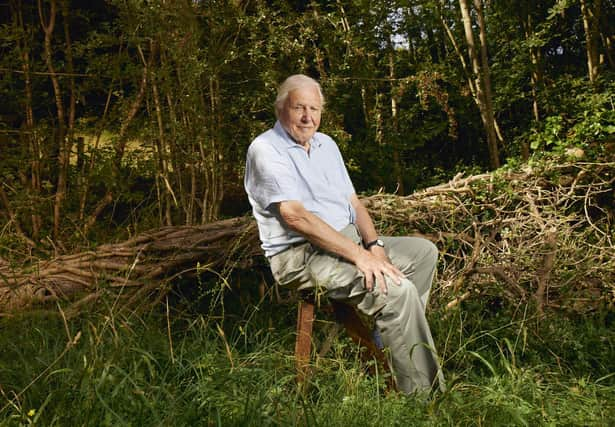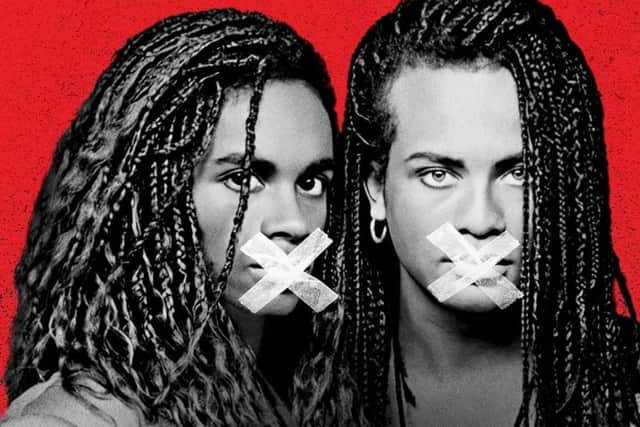TV week review: Planet Earth III, Life on Our Planet, Dark Hearts, Milli Vanilli


Now, it is all too tempting to think of Attenborough as this ingenious creature and Morgan Freeman, narrator of the Netflix rival Life on Our Planet, as the poor insect. Freeman has the voice - mellifluously, achingly profound - but Attenborough is Attenborough, though I’m pretty sure he’s never gobbed anyone right out of a tree.
Listen carefully and you almost hear Freeman mutter under his breath: “Any chance of a decent script?” You can almost hear him hiss, possibly in the direction of executive producer Steven Spielberg: “How many times do I have to say the word ‘dynasty’?” (Half a dozen in the first ten minutes alone).
Advertisement
Hide AdHe bombards us with big numbers: “Four billion years … two billion years … 66.04 million years.” He seems to be desperately clutching for moments in time when Attenborough was not presenting nature programmes on TV. He tries again: “Ninety nine percent of all species that have ever existed are now extinct.” Yes, but before a good number went on their way rejoicing, our Dave would have been around to hunker down in the long grass to observe mating rituals.


Life on Our Planet has dared to launch in the same week as Attenborough’s latest opus and chucks dinosaurs at the great man while attempting to tell the story of absolutely everything. There are sabre-tooth tigers which unfortunately look like common-or-jungle tigers wearing joke-shop gnashers. The CGI for the dinos is impressive, though I doubt Attenborough is unnerved. He simply gets on with his pen-portrait of the teeny-tiny translucent sea angel in the Arctic Ocean, keenly awaiting 300 billion tons of ice melting, which releases loads of lovely nutrients. Just you wait: the global warming deniers will adopt it as their mascot.
Planet Earth III’s opener focuses on coasts. There are more than a million miles of them around the world but Attenborough’s Southern right whale always returns to the same spot off Argentina to give birth. Attenborough can throw big stats around, too, but his are more relatable. For instance, the whale produces 200 litres of milk daily for her young. That’s more than three times the average person’s entire consumption of the white stuff in a year. (Yes, I went away and checked).
Freeman tries to fight back with more magisterially-intoned cliche: “Enduring blueprint for success … The last great bloodline … The most iconic dynasty of them all.” But Attenborough doesn’t have to try so hard. He’s the nation’s grandfather, after all. We know how his shows go. Two-thirds of the way through the music surges for stories of poignancy, usually related to climate change. In this episode, Raine Island where half the Pacific’s green turtles come to rest, but if sea levels rise as predicted it will disappear.
So, in their telling, do we ever suffer from natural world fatigue? No, we don’t. And here’s something else about Attenborough: you may have seen that Cardiff University Students’ Union have banned light blue shirts and chinos, the uniform of a type of undergraduate who’ve been responsible for “dangerous behaviour”. This has been Attenborough’s attire of choice since starting out in 1954 with Zoo Quest, around the same time as the southern pig-footed bandicoot was declared extinct (checked this, too). I wouldn’t be surprised if these rugger b*gg*rs are hoping his return to our screens will cast them in a more favourable light. And maybe Sir David doesn’t only save animals.


BBC4’s latest imported drama, set in the Middle East, begins with men with machine guns storming a house, dragging children away and smashing through an interior wall, behind which their quest has been hiding. In the current circumstances, Dark Hearts’ opening scenes make for a chilling watch.
Advertisement
Hide AdThis is Iraq in 2016, Isis are being hunted down and the raiding party are French. Hang on, those “cheese-eating surrender monkeys”? Now, now, that’s cheeky, even though the phrase was coined by a Scot (The Simpsons’ Groundskeeper Willie). Although not involved in the original invasion, France came along later, and the series follows an elite commando unit intent on rooting out terrorists.
They have guys called Rimbaud (after the poet, presumably) and Spit (er, in tribute to Tiswas and Bob Carolgees’ dog?). They have Thierry Godard from the brilliant Spiral, maybe the Frenchest Frenchman since Gerard Depardieu. Then there’s Sab, just arrived as the new sniper. “A woman? What is this s**t?” grumbles one of the team, and the answer comes right back: “She could nail a fly on your arse at 1.8 kilometres.” It’s gripping stuff. You can almost feel the prickliness of the dust-blown heat. And turning every corner feels like it could be a terrible trap.
Advertisement
Hide AdThere’s a moment in the documentary Milli Vanilli (Paramount+) where the dreadlocked, bodypopping chart sensations of 1989 answer fans’ questions, one of which goes: “When you’ve performed has anything really embarrassing happened to you?” “Uh, yeah,” answers Robert “Rob” Pilatus, and in the next scene, on the next date on their MTV tour of the States, the backing track gets stuck on repeat. Rob and Fabrice “Fab” Morvan bolt from the stage, diving headlong into pop’s so-called greatest scandal.
But not right away. The record company contemplated intervening but sales were going through the roof and so didn’t. From that moment, the German-French double-act started to sweat. “We didn’t sing on those records, we were lying,” says Fab of their lip-synching. “And they were going to catch us.”
This is an incredible saga. “All of the answers about how pop music is made rest in this story,” says critic Hannif Abdurraqib, perhaps the most perceptive voice in Luke Korem’s film. Incredibly sad, too, for after Milli Vanilli’s disgrace, after the pair became estranged, Fab discovered Rob stumbling around outside LA’s Viper Room. He helped his old friend to get home, which turned out to be a crack-house, and not long afterwards Rob was dead.
Both came from troubled backgrounds. When prospective foster parents visited Rob’s orphanage he desperately hoped to attract their attention by drinking from the toilet bowl. This testimony comes from the former PA/lover of pop Svengali Frank Fabian who has questions to answer about the exploitation of black acts but isn’t featured. Rob and Fab could dance but Fabian didn’t like their voices. “Don’t ever f**k with me,” he warned, after recruiting session singers for what became the smash hit in 23 countries, “Girl You Know It’s True”.
It wasn’t true and Milli Vanilli had to return their Grammy. In a farcical moment reminiscent of the endgame for Smashie & Nicey (“We resign!” … “You’re sacked!”) duo and guru race to be first with coming clean. But isn’t pop illusory? “There was no real crime here,” says Abdurraqib finally, “but it did cost a life.”
Comments
Want to join the conversation? Please or to comment on this article.